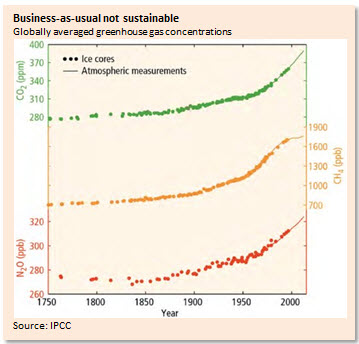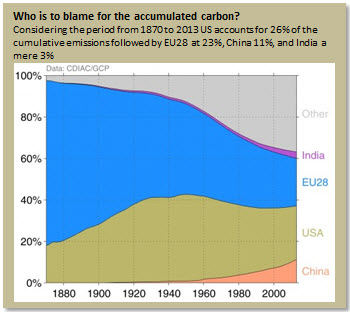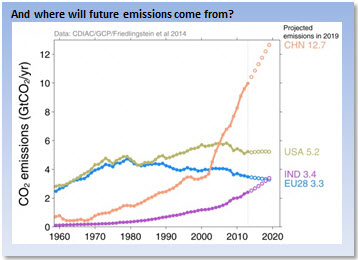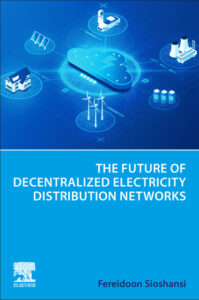IPCC repeats its message in stronger terms and with less uncertainty
This is a sample article from the November 2014 issue of EEnergy Informer.
Humans are causing irreversible damage to the planet from burning fossil fuels. The evidence is unequivocal; the time for debating the issue and procrastinating is over, now is the time for action. That, more or less, is the message conveyed in the United Nation’s Intergovernmental Panel on Climate Change’s (IPCC) 5th assessment report released with great fanfare in Copenhagen in early Nov 2014. Those who already believe in the seriousness of climate change are likely to become more convinced; those who deny the scientific evidence are likely to remain skeptical. What is new? Apparently the message is finally sinking in, as illustrated by the joint US-China announcement.
In releasing the IPPC’s latest report, UN Secretary-General Ban Ki- moon said, “We must act quickly and decisively if we want to avoid increasingly disruptive outcomes,” adding, “If we continue business-as-usual, our opportunity to keep temperature rises below the internationally agreed target of 2 degrees Celsius, will slip away within the next decades.”

U.S. Secretary of State John Kerry, a staunch believer in climate change, agreed, stating, “The longer we are stuck in a debate over ideology and politics, the more the costs of inaction grow. Those who choose to ignore or dispute the science so clearly laid out in this report do so at great risk for all of us and for our kids and grandkids.”
The report is intended for the policymakers from 195 nations working on an international agreement to rein in emissions expected at next year’s Conference of Parties (COP) in Paris in December 2015. Although many now believe that the ultimate outcome may be in the form of a number of unilateral announcements, pledges or declarations such as those already made by US, China and the European Union rather than a globally biding target as envisioned under the ill-fated Kyoto Protocols.
Among the highlights of the 116-page synthesis report is the finding that, “The atmosphere and ocean have warmed, the amounts of snow and ice have diminished, and sea level has risen,” while alarming policymakers that warming caused by manmade CO2 emissions “is effectively irreversible.”
“Rising rates and magnitudes of warming and other changes in the climate system, accompanied by ocean acidification, increase the risk of severe, pervasive, and in some cases irreversible detrimental impacts,” the report states. “Future climate change will amplify existing climate-related risks and create new risks.”

IPCC chairman Rajendra Pachauri, a controversial figure due to his strong convictions and occasionally sensational statements, said “To avoid the chaos of runaway climate change, we know that we need to dramatically reduce global emissions of greenhouse gases,” adding, “The scientific community has now spoken. But we are passing on the baton to politicians [and] to the decision-making community.” Fair enough.
Professor Jim Skea, a vice-chair of the IPCC’s Working Group 3, described the latest report as “the most important report the IPCC has ever produced.” It reiterates that climate warming is “unequivocal,” points out that atmospheric greenhouse gases are now at their highest levels in 800,000 years, and says human activity is “extremely likely” to be the dominant cause of the warming since the mid-20th century.
“I don’t think politicians will have the excuse that they haven’t heard the evidence,” Skea said. The IPCC report says that emissions need to fall by 40-70% by 2050 if the world is to give itself a good chance of staying within the 2C limit. European Union leaders recently pledged to cut emissions by 40% by 2030.

More than half of the world’s current emissions are now covered by formal climate policies, according to Skea. “The question is how quickly we get on with the job.”
Bureau of Meteorology researcher Scott Power, a lead author on the IPCC’s Working Group 1, pointed out that the world has already used up around three-quarters of its total carbon budget emphasizing that global emissions are now at their highest ever level and growing by 2.2% per annum.
Total emissions since the Industrial Revolution are around 600 gigatonnes of carbon, he said. If we go past around 800 gigatonnes, it would “lock in” warming of more than 2C. “That would increase the likelihood of severe and pervasive impacts.”
Will any of this make any difference? The fossil fuel lobby and its supporters are likely to stick to the status quo for as long as they can. Despite the mounting evidence, they refuse to acknowledge that business as usual is not likely to be sustainable over the long-run.
Major oil, gas and coal companies are doing their best to buy time. Oil majors including Exxon Mobil Corp and Royal Dutch Shell Plc have publicly reiterated their historical positions that they don’t believe their existing assets or their expensive upstream investments are likely to become stranded as a result of a global binding climate regulation. The recent US-China joint announcement to reduce and peak emissions of the world’s two largest emitters, respectively, plus mounting pressure to divest pension fund investments from fossil fuel components suggests that they may have to rethink their stated positions sooner rather than later.
Politicians, by and large, remain skeptical on the costs of the transition to a low carbon future despite recent studies that suggest such a transition, properly implemented, may reduce global annual economic growth by as little as 0.06 percentage points this century compared to a business-as-usual scenario. And that doesn’t even include the likely benefits of addressing climate change. The tide may gradually be turning.

